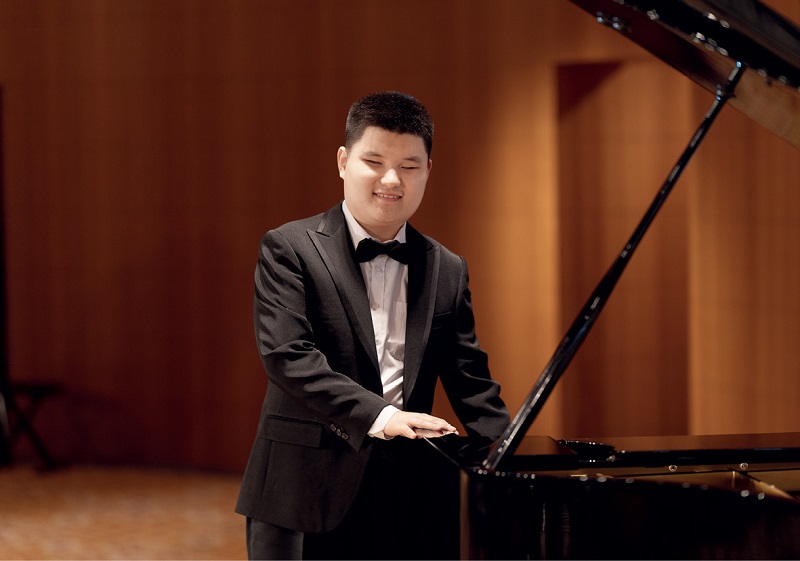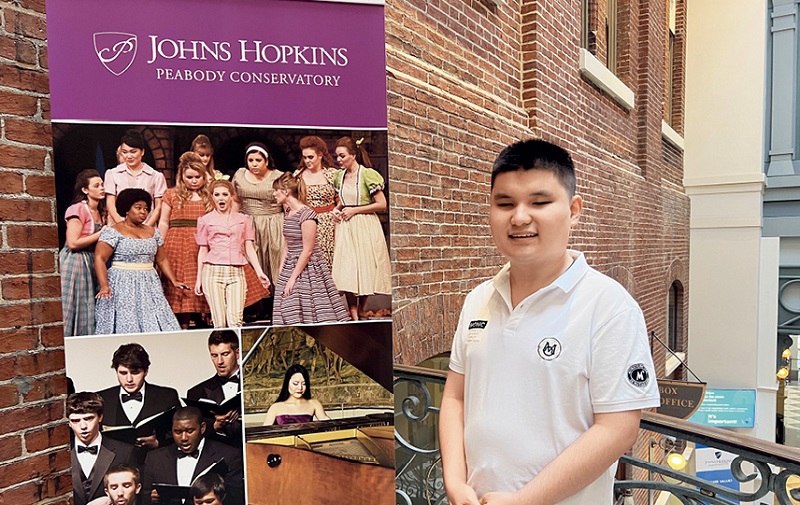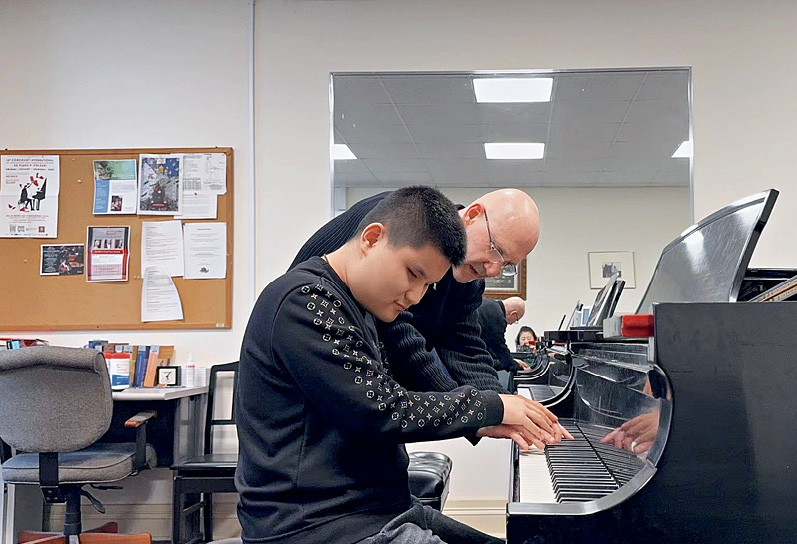A blind pianist builds his future with music.
When Liu Hao played the last note of French composer Claude Debussy’s Clair de Lune at the Lang Lang Master Class in Beijing on July 10 and slowly raised his hands in valediction, the audience erupted into thunderous applause. Many came up to him to give him flowers and take photos with him.
Piano maestro Lang Lang, after whom the classes are named, also paid his tribute, saying, “Liu and I have known each other for a very long time, and he has made great progress. We can feel his emotions from the changes in the tones of his performance.”
“Playing the piano brings me a lot of joy. I experience different music styles and emotions through the compositions of many masters and I also express my inner thoughts through the notes,” Liu told China Today.

Liu Hao, a blind pianist, prepares for a performance.
The Extraordinary Triplet
Piano has been Liu’s best friend and his companion on his extraordinary journey from an ordinary home in north China to the international stage. It has also been his means of survival.
Liu was born in 2001 in Chifeng City, north China’s Inner Mongolia Autonomous Region. As a premature triplet, Liu suffered from retinal damage, which led to his blindness shortly after his birth. One day, when he was three years old, his mother Kang Guiqin heard him play something on a toy electronic keyboard that she had never heard before. She asked what he was playing and he said it was a nursery rhyme he had heard on the recorder in the morning. She asked him how he could play it and he told her he just remembered the sound of each key.
This made Kang realize that perhaps her son had a talent that would make his life easier and she started to look for a music teacher for him. But it was no easy task.
At that time, the family was very badly off financially and other family members could not understand why she wanted him to learn a “useless” thing. Many teachers too turned her down because they thought they would not be able to teach a blind child.
But Kang finally found someone willing to teach Liu free. Liu Yongxue, principal of Yamaha Electronic Keyboard School in Chifeng, began to teach him. At the age of four, Liu became his special and most talented student. Blessed with an incredible memory, he could play any piece he heard without ever seeing the original music. Later, he won a gold medal in a competition in Beijing, the only sightless player among all the winners.
The principal then suggested that Kang should take him to Beijing to continue his music lessons since the capital had facilities to learn to read notations in Braille. Once again, despite her family’s opposition, Kang headed for Beijing with Liu by train. She had only RMB 300 (US $41.6) with her.

Liu Hao studying at Johns Hopkins Peabody Conservatory in the U.S., where he has been since 2022.
The Piano Journey
How did the switch from the keyboard to the piano occur? When he was six, Liu heard the piano on TV and was immediately attracted to this music that was totally different from the electronic keyboard music he was learning. Kang told him that it was the piano and that the pianist playing it so beautifully was Lang Lang, an internationally renowned artist.
As luck would have it, it was Lang with whom Liu played his first piano concert. In 2007, Liu was selected to perform with Lang at a concert in Nanjing in east China. But Liu, then six, knew only how to play the electronic keyboard. So Kang found a teacher in a piano shop to teach him the piece he had to play. After a week’s crash course, Liu was ready to perform with Lang. During the rehearsal, when Lang learned that Liu had been learning the electronic keyboard for just one year, he encouraged him to continue his lessons.
The encouragement gave Liu and his mother great confidence. Also, the concert brought him a lot of limelight. It led to invitations to play in more concerts. Some piano shops provided him free pianos and some music teachers wanted to teach him. Also, some charitable foundations sponsored him so that he could live and take lessons in Beijing.
Professor Wang Haibo from the School of Arts & Communication of Beijing Normal University learned about Liu’s story from a TV program. When she heard that he couldn’t find a regular piano teacher, she contacted his mother and said she would be happy to teach him. The lessons were time-consuming. It took Liu and Kang two hours of bus journey just to go to Wang’s home from where they lived. Then after one hour of lessons, it was another two-hour journey back, but Liu and his mother persevered.
The Beijing Apple Charity Foundation was another major benefactor, funding Liu’s tuition and living expenses for more than 10 years. When Wang Qiuyang, founder of the charity, was asked why it was supporting Liu, she answered, “I think he is a genius, and our goal is to cultivate talent for our country.”
The person to whom Liu is indebted most is his mother. Besides fighting her family for him and being his daily companion, she has also been his teacher. She taught herself musical notations and Braille so that she could translate scores into Braille, which helped Liu immensely. “My mother often stayed up late at night to translate music into Braille,” Liu said. “Once, our landlady noticed our lights were still on at 1:00 in the morning and came to find out if anything was wrong.”
Everything was fine, it was just Kang helping Liu transcribe music into Braille.
“I felt my mother was working too hard, and I must study harder in the future. I cannot let her down,” Liu said. The more he progressed, the longer the scores became. Kang would read out the score to Liu and record it on tape.

Liu Hao studying piano with Alexander Shtarkman, head of the piano department at Peabody Institute.
 On the International Stage
On the International StageIn 2015, Liu began to take lessons from Professor Sheng Yuan from the Piano Department of the Central Conservatory of Music in Beijing, studying under him for the longest time.
For Sheng, the biggest challenge in teaching Liu was that he could not use visual descriptions to inspire Liu to inject emotions in his music. In Liu’s world, there is no color or shape, so he can imagine things only through the objects he has touched. So Sheng would try to translate emotions in a tactile way. For example, to describe moonlight flowing like fine water, he turned the water faucet to the lowest so that only a thin flow of water trickled over Liu’s hands.
While sensitive, Liu was also persistent, practicing difficult techniques over and over again. At times, he would swing his hands up and down in the air to simulate playing the piano. He proved his musical competence with numerous trophies and applause. He won multiple awards in domestic and international competitions and featured in programs by China’s national broadcaster and many provincial TV stations.
In January 2016, he held his first solo piano concert at the Zhongshan Park Music Hall in Beijing. Nine months later, he went to Vienna on invitation to play Mozart’s concerto at the Vienna City Hall.
He has also performed on the international stage, such as the Carnegie Hall, the John F. Kennedy Center for the Performing Arts, and the State Theater in New Jersey in the United States. In addition, he shares his learning experience at domestic and overseas schools. And he has kept honing his skills, taking online classes from piano education professor Jerome Lowenthal from the Juilliard School, the renowned music school in the United States.
Influenced by the academic experiences of Lang and Sheng, Liu wanted to study in the United States like they did. In April 2022, after more than two years of hard work and the assistance from some charities, he passed all the required exams and was accepted by three music schools in the country. Out of them, he chose the Peabody Institute of the Johns Hopkins University to study under Alexander Shtarkman, head of the piano department.
“Professor Shtarkman is a patient teacher,” he said. “He used various methods, such as thumb positioning and group practice, for some difficult performances. Also, he always discussed with me how to perform the music and paid great attention to my own ideas.”
Nearly 20 years of learning the piano has helped Liu achieve personal growth through music. Now, he wants to share the joy of music with more listeners. In August this year, he has solo concerts scheduled in four Chinese cities — Xi’an, Changsha, Guiyang, and Beijing.
“The most important thing for a pianist is to bring happiness to others,” Liu said. “Learning has no end, and music has no end either. I hope I can continue to improve and perform until I can no longer play.”